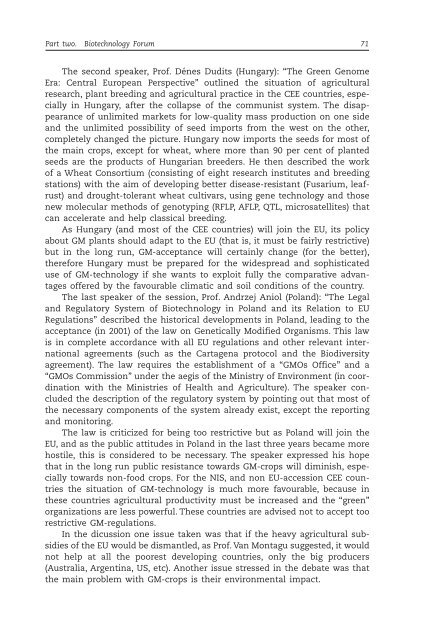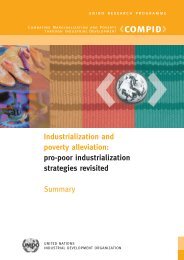TECHNOLOGY FORESIGHT SUMMIT - Unido
TECHNOLOGY FORESIGHT SUMMIT - Unido
TECHNOLOGY FORESIGHT SUMMIT - Unido
Create successful ePaper yourself
Turn your PDF publications into a flip-book with our unique Google optimized e-Paper software.
Part two. Biotechnology Forum 71<br />
The second speaker, Prof. Dénes Dudits (Hungary): “The Green Genome<br />
Era: Central European Perspective” outlined the situation of agricultural<br />
research, plant breeding and agricultural practice in the CEE countries, especially<br />
in Hungary, after the collapse of the communist system. The disappearance<br />
of unlimited markets for low-quality mass production on one side<br />
and the unlimited possibility of seed imports from the west on the other,<br />
completely changed the picture. Hungary now imports the seeds for most of<br />
the main crops, except for wheat, where more than 90 per cent of planted<br />
seeds are the products of Hungarian breeders. He then described the work<br />
of a Wheat Consortium (consisting of eight research institutes and breeding<br />
stations) with the aim of developing better disease-resistant (Fusarium, leafrust)<br />
and drought-tolerant wheat cultivars, using gene technology and those<br />
new molecular methods of genotyping (RFLP, AFLP, QTL, microsatellites) that<br />
can accelerate and help classical breeding.<br />
As Hungary (and most of the CEE countries) will join the EU, its policy<br />
about GM plants should adapt to the EU (that is, it must be fairly restrictive)<br />
but in the long run, GM-acceptance will certainly change (for the better),<br />
therefore Hungary must be prepared for the widespread and sophisticated<br />
use of GM-technology if she wants to exploit fully the comparative advantages<br />
offered by the favourable climatic and soil conditions of the country.<br />
The last speaker of the session, Prof. Andrzej Aniol (Poland): “The Legal<br />
and Regulatory System of Biotechnology in Poland and its Relation to EU<br />
Regulations” described the historical developments in Poland, leading to the<br />
acceptance (in 2001) of the law on Genetically Modified Organisms. This law<br />
is in complete accordance with all EU regulations and other relevant international<br />
agreements (such as the Cartagena protocol and the Biodiversity<br />
agreement). The law requires the establishment of a “GMOs Office” and a<br />
“GMOs Commission” under the aegis of the Ministry of Environment (in coordination<br />
with the Ministries of Health and Agriculture). The speaker concluded<br />
the description of the regulatory system by pointing out that most of<br />
the necessary components of the system already exist, except the reporting<br />
and monitoring.<br />
The law is criticized for being too restrictive but as Poland will join the<br />
EU, and as the public attitudes in Poland in the last three years became more<br />
hostile, this is considered to be necessary. The speaker expressed his hope<br />
that in the long run public resistance towards GM-crops will diminish, especially<br />
towards non-food crops. For the NIS, and non EU-accession CEE countries<br />
the situation of GM-technology is much more favourable, because in<br />
these countries agricultural productivity must be increased and the “green”<br />
organizations are less powerful. These countries are advised not to accept too<br />
restrictive GM-regulations.<br />
In the dicussion one issue taken was that if the heavy agricultural subsidies<br />
of the EU would be dismantled, as Prof. Van Montagu suggested, it would<br />
not help at all the poorest developing countries, only the big producers<br />
(Australia, Argentina, US, etc). Another issue stressed in the debate was that<br />
the main problem with GM-crops is their environmental impact.

















